Dolce far niente – Bij een huwelijksverjaardag
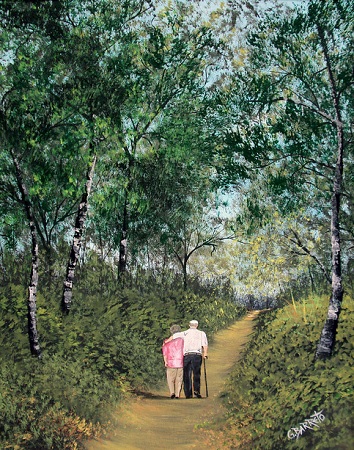
Soul Mates door Gloria E Barreto-Rodriguez, 2009
The Country of Marriage
I.
I dream of you walking at night along the streams
of the country of my birth, warm blooms and the nightsongs
of birds opening around you as you walk.
You are holding in your body the dark seed of my sleep.
II.
This comes after silence. Was it something I said
that bound me to you, some mere promise
or, worse, the fear of loneliness and death?
A man lost in the woods in the dark, I stood
still and said nothing. And then there rose in me,
like the earth’s empowering brew rising
in root and branch, the words of a dream of you
I did not know I had dreamed. I was a wanderer
who feels the solace of his native land
under his feet again and moving in his blood.
I went on, blind and faithful. Where I stepped
my track was there to steady me. It was no abyss
that lay before me, but only the level ground.
III.
Sometimes our life reminds me
of a forest in which there is a graceful clearing
and in that opening a house,
an orchard and garden,
comfortable shades, and flowers
red and yellow in the sun, a pattern
made in the light for the light to return to.
The forest is mostly dark, its ways
to be made anew day after day, the dark
richer than the light and more blessed,
provided we stay brave
enough to keep on going in.
IV.
How many times have I come to you out of my head
with joy, if ever a man was,
for to approach you I have given up the light
and all directions. I come to you
lost, wholly trusting as a man who goes
into the forest unarmed. It is as though I descend
slowly earthward out of the air. I rest in peace
in you, when I arrive at last.
V.
Our bond is no little economy based on the exchange
of my love and work for yours, so much for so much
of an expendable fund. We don’t know what its limits are–
that puts us in the dark. We are more together
than we know, how else could we keep on discovering
we are more together than we thought?
You are the known way leading always to the unknown,
and you are the known place to which the unknown is always
leading me back. More blessed in you than I know,
I possess nothing worthy to give you, nothing
not belittled by my saying that I possess it.
Even an hour of love is a moral predicament, a blessing
a man may be hard up to be worthy of. He can only
accept it, as a plant accepts from all the bounty of the light
enough to live, and then accepts the dark,
passing unencumbered back to the earth, as I
have fallen tine and again from the great strength
of my desire, helpless, into your arms.
VI.
What I am learning to give you is my death
to set you free of me, and me from myself
into the dark and the new light. Like the water
of a deep stream, love is always too much. We
did not make it. Though we drink till we burst
we cannot have it all, or want it all.
In its abundance it survives our thirst.
In the evening we come down to the shore
to drink our fill, and sleep, while it
flows through the regions of the dark.
It does not hold us, except we keep returning
to its rich waters thirsty. We enter,
willing to die, into the commonwealth of its joy.
VII.
I give you what is unbounded, passing from dark to dark,
containing darkness: a night of rain, an early morning.
I give you the life I have let live for the love of you:
a clump of orange-blooming weeds beside the road,
the young orchard waiting in the snow, our own life
that we have planted in the ground, as I
have planted mine in you. I give you my love for all
beautiful and honest women that you gather to yourself
again and again, and satisfy–and this poem,
no more mine than any man’s who has loved a woman.
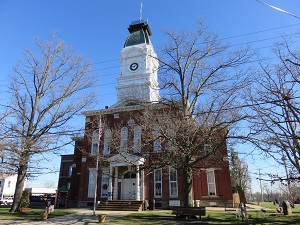
Wendell Berry (Henry County, 5 augustus 1934)
Henry County Courthouse in New Castle, Kentucky
De Nederlandse schrijver en dichter Ingmar Heytze werd geboren op 16 februari 1970 in Utrecht. Zie ook alle tags voor Ingmar Heytze op dit blog.
Lezen
Mijn boeken zijn meer
dan gebundeld papier
zoveel meer
dan een paar glazen inkt
op dood hout
het zijn stemmen
die nimmer
de stilte doorbreken
ruisende werelden,
plaatsen van rust
het zijn bomen
die weer zijn begonnen
te spreken
Testpiloot
Het tragische aan ruimtereizen
is dat je nergens komt; een baan
om de aarde, een vlag op de maan.
Aan bestemmingen geen gebrek,
het is alleen zo groot en leeg dat
groot en leeg de woorden niet meer
zijn. Je reist te traag, je leeft te kort,
je bent van stof en niet van licht.
Toch zit ze naast me op de bank,
ze zoekt een man van buiten
met een auto of een brommer,
iedereen hierbinnen is gek.
Ze was op weg, er waren stemmen,
vals en echt, de stad en andere drugs,
ze stak het huis in brand omdat ze
honger had. Ze werd gebruikt
als testpiloot. Het contact met
de basis is verloren, ze reist verder
door behandelkamers, heerlijk nieuwe
werelden, haldol, fluanxol,clozapine.
Nocturne
De sterren zijn met veel, vanavond.
Grote ogen in de nacht:
een meisje zwiert haar rok tot bloemen
op een dansfeest aan de gracht.
Een jongen wankelt door de stad.
Zijn benen slepen uit de maat.
De stoep ligt slordig langs de straat.
Hij heeft zijn flessen leeggedacht.
Hij is zijn mooiste woorden kwijt
en niemand die zijn pijn begrijpt;
zij danst met sterren in het haar
en hij – een slechte goochelaar
die stram naar vallend herfstblad grijpt
en briefjes post aan de oneindigheid.

Ingmar Heytze (Utrecht, 16 februari 1970)
De Zuidafrikaanse dichteres Elisabeth Eybers werd geboren op 16 februari 1915 in Klerksdorp. Zie ook alle tags voor Elisabeth Eybers op dit blog.
Meisie
Nou is sy dronk en pronkerig,
’n kelk wat om die stamper gloei,
angsvallig voor die wind wegwiel,
verwelkbaar na die son toe keer.
Sy moet nog regop word en dig,
’n boom wat vérgewortel groei,
vir haar behoefte aan klorofiel
én lug én aarde visenteer.
Girl
She is an incandescent cup
tilting its pistil dizzily,
wheeling before the wind and still
turning its petals to the glare.
She must contrast and straighten up,
a rooted and far-reaching tree
that for its store of chlorophyll
investigates both earth and air.
Nolensvolens
Südafrika, als ich dich verlassen mußte,
nicht deiner Dummheit, sondern eignen Schmerzes wegen
– mit einem Tonfall, der das Land meiner Herkunft verrät –
wußte ich noch nicht, daß ich auch als Gast gelten würde
auf dieser Party, wo sie dich traktieren
mit amtlichem, monomanem Haß.
Vertaald door Arno Piechorowski
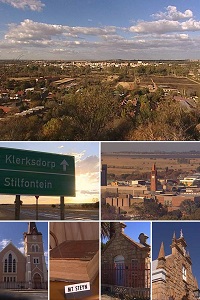
Elisabeth Eybers (16 februari 1915 – 1 december 2007)
Impressies van Klerksdorp
De Surinaams-Nederlandse schrijver, columnist, essayist, programmamaker en presentator Anil Ramdas werd geboren in Paramaribo op 16 februari 1958. Zie ook alle tags voor Anil Randas op dit blog.
Uit: Badal
“Een paar weken later had hij het paar weer gezien, in dezelfde bus, in de andere richting. Ze zaten op een tweezits bank en hielden elkaars hand vast. S. belde. Badal had eerder op de dag zijn telefoon weer aangezet en zonder te kijken alle berichten met gemiste oproepen gewist. Bij een nieuw begin hoorden geen oude telefoontjes. Waar ben je in godsnaam en waarom was je telefoon al die tijd uitgeschakeld?’ vroeg S. ‘Ik ben in een Italiaans restaurant met een dove Turk. Hij heeft agliolio voor me gemaakt die nergens naar smaakt.’ `En waar is dat restaurant?’ ‘In Zandvoort.’ Waarom in Zandvoort?’ `Omdat hier alleen white trash woont.’ Dat was niet zomaar een waarneming, hij baseerde het op een mathematische theorie. Zwarte mensen hadden geen hond. Enkele creoolse jongens in de Bijlmer daargelaten – die liepen met een pitbull rond om de mensen banger te maken dan zijzelf voor de mensen waren. Blanke mensen uit de middenklasse die wel een hond hadden, lieten hun huisdieren netjes uit in parken waar ze niet aan de lijn hoefden. Een hondenplee, of een losloopgebied, zoals het officieel heette. Of ze ruimden de uitwerpselen keurig op met een zakje. Wie met een hondenpoepzakje of gewoon een boterhamzakje om de hand liep, gaf zijn maatschappelijke status weer. Mensen met tatoeages of een verwaarloosd gebit, mensen die ‘Een beetje verliefd’ van André Hazes meezongen, mensen die op de broodjesafdeling van de Hema in Zandvoort werkten, waardoor je lang op je bestelling moest wachten, mensen die eruitzagen alsof ze hun avonden halfdronken doorkwamen met sas 6 op de flatscreen tv die nog moest worden afbetaald, die mensen lieten hun hond overal uit, vooral op trottoirs met een versmalling, waardoor je er alleen als verspringer overheen kon. In Zandvoort waren er op alle trottoirs hoopjes poep, ondanks de gemeentelijke stoeptegels met een overduidelijke tekening en de overduidelijke tekst ‘Honden in de Goot’. Ergo: hier woonde white trash. Dit kale, neonverlichte restaurant met kunsthouten tafels en sportverslagen op de achtergrond was voor die white trash bedoeld. Hij liet de agliolio staan om zich te concentreren op het telefoongesprek. `Sinds wanneer geef je zo om white trash,’ vroeg S. `Sinds de laatste weken. Kijk, er is veel onderzoek gedaan naar allochtonen, vooral naar Marokkanen. Blanken worden neergezet als slachtoffers die hun mooie arbeidersbuurten in verval zien raken door toedoen van allochtonen. Maar naar white trash wordt niet gekeken.’ ‘En jij gaat naar ze kijken.’ `Het is onontgonnen terrein zeg ik je, een goudmijn.’ `Harry,’ zei ze rustig, ‘waar ben je morgenmiddag, rond twee uur? Geef me een adres.’
Ze droeg een donkerblauwe rok en een rode bloes. Hij had zich gewassen, geschoren en gekamd. Zijn grijze hemd was schoon, maar zijn zwarte broek was aan een wasbeurt toe. Op zwart zie je geen vlekken, zei hij altijd. Op het verwarmde terras legde ze haar tas op een lege stoel, schikte haar haar en bestelde een cappuccino. Hij bestelde een 7-Up. Ze keek naar hem, en toen naar haar horloge. ‘Ik ben gestopt,’ zei hij. Hij keek nonchalant naar de voorbijgangers.”
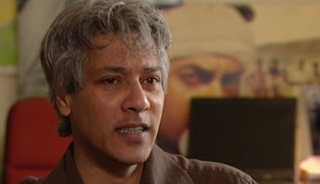
Anil Ramdas (16 februari 1958 – 16 februari 2012)
Zie voor meer schrijvers van de 16e februari ook mijn blog van 16 februari 2018 en ook mijn blog van 16 februari 2016 en ook mijn blog van 16 februari 2015.


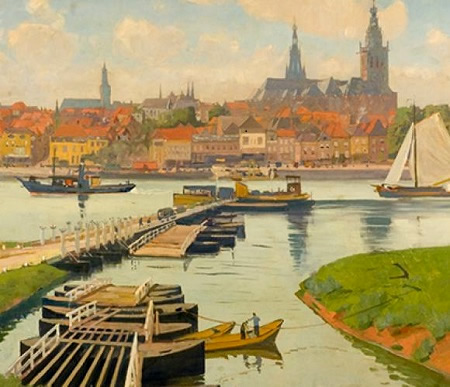



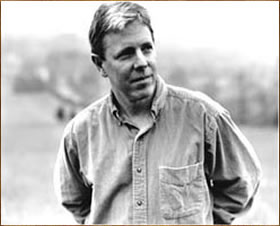
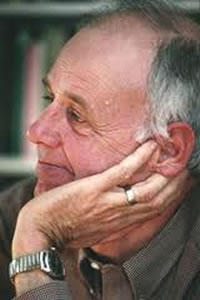
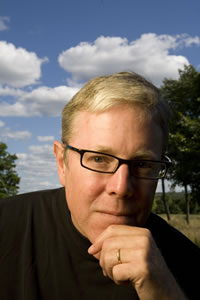



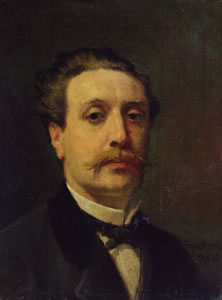


![sergioramirez22[1] sergioramirez22[1]](https://romenu553547602.files.wordpress.com/2008/08/3ec2a-dyn006_original_295_221_pjpeg_2535747_104da7fe8cdeae7132a9dd2b25ace32f.jpg)










